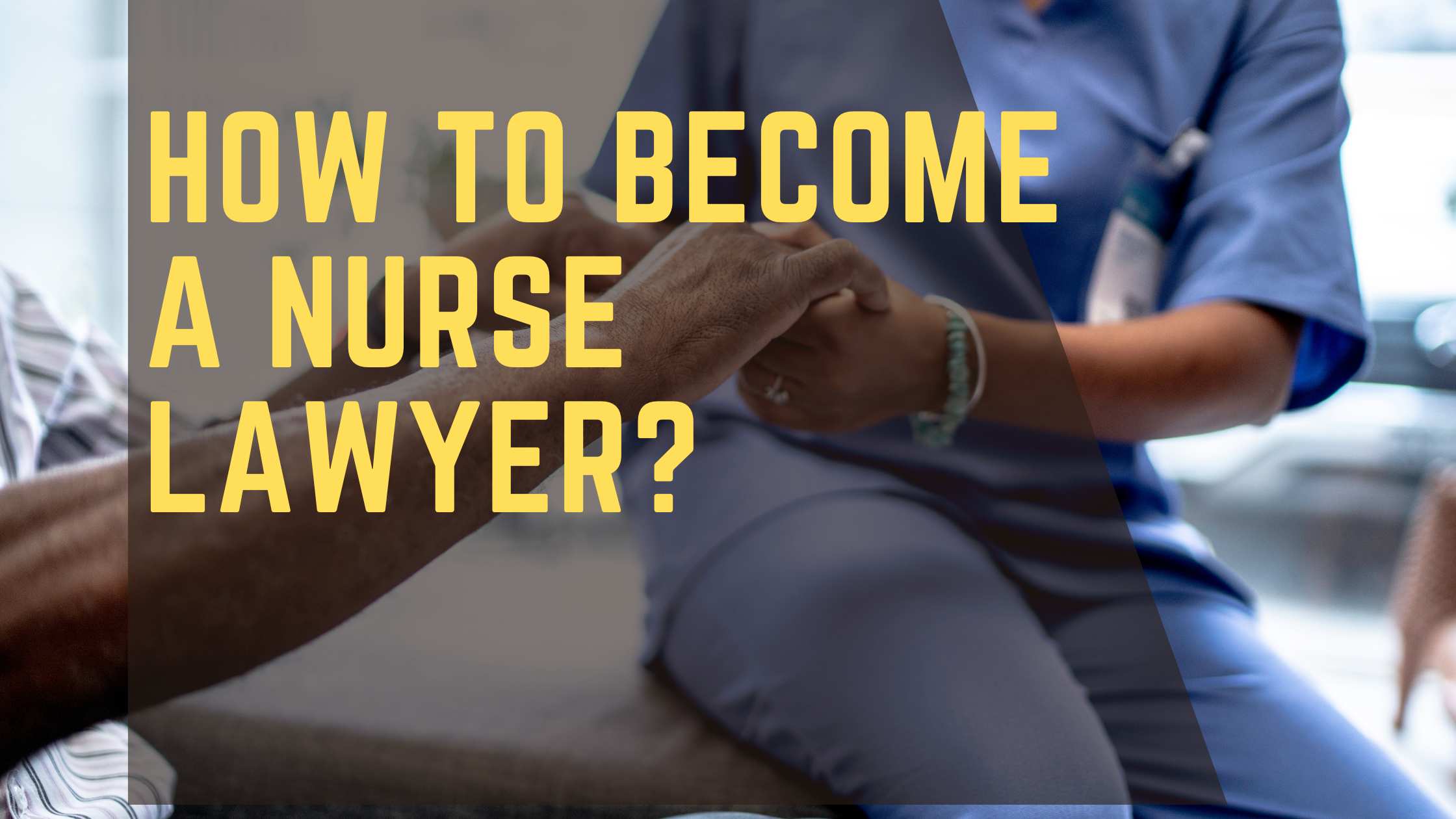How to Become a Nurse Lawyer?

To become a nurse lawyer, you must first become a registered nurse (RN) and then obtain a law degree. Passing the bar exam in your jurisdiction is also essential to practice law.
Embarking on a career as a nurse lawyer combines the healthcare and legal sectors, offering a unique blend of expertise for advocacy, legal counsel, and patient care policy. This career path requires a strong foundation in nursing, followed by specialized legal education.
How to Become a Nurse Lawyer? Nurse lawyers are professionals with the capacity to navigate complex medical scenarios and legal challenges, making them invaluable to healthcare organizations, law firms, and government agencies. Their dual role equips them to offer expert healthcare insights in legal matters and to guide policy decisions that shape the industry. With nursing and law both being high-demand fields, merging these disciplines as a nurse lawyer can lead to a dynamic and impactful career with diverse opportunities.
The Intersection Of Healthcare And Law
The worlds of healthcare and law often intersect in complex and fascinating ways. At this crossroads, professionals who have expertise in both fields are in high demand. These unique individuals navigate legal and medical terrain, bringing a wealth of insight and invaluable skills to each domain.
What Is A Nurse Lawyer?
A nurse lawyer is a licensed professional with dual qualifications in nursing and law. This expert harnesses their medical knowledge and legal proficiency to advocate for patients, contribute to health policy, and bridge gaps in healthcare. With the emergence of intricate healthcare regulations and the increase in medical litigation, the role of nurse lawyers is more crucial than ever. Their rare blend of skills opens doors to a variety of career paths.
Roles And Responsibilities
The roles and responsibilities of nurse lawyers cover a broad spectrum. Key duties include:
- Legal Consulting: They offer advice on medical cases to law firms and attorneys, transforming complex medical jargon into clear insights.
- Advocacy: They stand as patient advocates, striving for quality care and ethical treatment.
- Risk Management: Their input helps healthcare organizations minimize risk and comply with regulations.
- Policy Making: They contribute to the creation and revision of health policies, ensuring they are just and efficient.
Additionally, nurse lawyers have opportunities in teaching, research, and writing on topics that merge healthcare with legal issues. Their work often helps shape the future of both professions.

Credit: issuu.com
Starting Out: Educational Pathways
The journey to becoming a nurse lawyer starts with specific educational steps. This unique career marries the medical world with the legal realm. Those interested must gain expertise in nursing and law. Drawn to this path? Here’s how to pave your way through the educational maze to emerge as a qualified nurse lawyer.
Nursing Credentials Required
To kickstart your journey, a nursing background is a must. Begin with the groundwork: obtaining a nursing degree. Below outlines the basic requirements:
- Complete an Accredited Nursing Program: This can be an Associate Degree in Nursing (ADN) or a Bachelor of Science in Nursing (BSN).
- Pass the NCLEX-RN Exam: A critical step to become a licensed Registered Nurse (RN).
- Gain Clinical Experience: Field experience is vital for practical skills and knowledge.
Law School Admission And Jd Programs
With a solid nursing background, set your sights on the blend of legal studies. Here’s a simple guide to law education:
| Step | Action | Requirement |
|---|---|---|
| 1 | Prep for LSAT: The Law School Admission Test assesses readiness for law school. | Book study schedules and practice exams are crucial. |
| 2 | Choose Accredited Law Schools: Research and select schools that fit your goals. | Aim for ones with strong health law programs. |
| 3 | JD Program Enrollment: A three-year Juris Doctor program is the next phase. | Commitment to extensive legal study and internships. |
You must score well on the LSAT to enter prestigious programs. In law school, focus on courses linking law and healthcare. These will prepare you for a seamless merger of your dual expertise as a nurse lawyer.
Gaining Experience In The Field
Pursuing a career as a nurse lawyer blends the worlds of healthcare and law. Robust experience in both fields is crucial. This guide highlights steps to gain the relevant experience.
Clinical Nursing Experience
Begin with solid nursing experience. The following points underline its importance:
- Earn a nursing degree. A Bachelor of Science in Nursing (BSN) is recommended.
- Obtain a license. Pass the NCLEX-RN exam to become a Registered Nurse (RN).
- Work in diverse settings. Hospitals, clinics, and other healthcare facilities offer essential hands-on practice.
- Specialize if desired. Specialties like pediatrics or oncology can provide in-depth knowledge.
Internships At Law Firms Or Legal Departments
| Internship Type | Benefits |
|---|---|
| Law Firms | Learn case preparation, legal research, and client interactions. |
| Corporate Legal Departments | Understanding regulatory compliance and corporate governance. |
| Government Agencies | Insight into public health policy and administrative law. |
Internships provide a bridge between academic knowledge and practical skills. Seek internships early. They introduce legal environments and improve understanding of the law’s impact on healthcare.
Network during internships. Connections lead to mentorship and job opportunities. Use them to learn directly from experienced professionals. Apply your clinical insight to legal scenarios.

Credit: www.chellelaw.com
Acquiring Dual Licensure
Acquiring dual licensure is a pivotal step for those merging nursing with legal expertise to become nurse lawyers. This unique combination of skills requires rigorous education and examinations. Aspiring nurse lawyers must first conquer the NCLEX-RN before tackling the bar exam.
Passing The Nclex-rn Examination
To practice as a registered nurse, passing the NCLEX-RN is a must. This test assesses the knowledge needed for entry-level nursing. Follow these steps to ensure success:
- Complete a accredited nursing program.
- Apply for the nursing license with the relevant state board.
- Register for the NCLEX-RN with Pearson VUE and pay the fee.
- Prepare using study guides, courses, and practice tests.
- Schedule your exam and pass to earn the RN credential.
Succeeding In The Bar Exam
After nursing, the next challenge is the bar exam. A law degree from an ABA-accredited – law school preludes this test. Here’s how to ace the bar:
- Obtain a JD degree from an accredited institution.
- Meet all admission requirements for the state bar association.
- Incorporate bar review courses into your study plan.
- Dedicate ample time for thorough preparation.
- Complete the exam, which may include multiple-choice, essays, and performance tests.
Career Advancement Opportunities
Career Advancement Opportunities for nurse lawyers come in many shapes and sizes. Bridging the gap between healthcare and law, these professionals find themselves on a unique trajectory. They can carve out specialized niches or pursue further education. With a combination of clinical experience and legal knowledge, nurse lawyers’ growth potential skyrockets. Let’s explore how they can take their careers to the next level.
Areas Of Specialization
Focusing on a particular area of law allows nurse lawyers to become highly sought-after experts. They can align their healthcare background with their legal practice for an edge in the job market. Nurse lawyers can specialize in different areas:
- Medical Malpractice: Represent victims of healthcare negligence.
- Health Policy: Shape the laws that govern healthcare systems.
- Risk Management: Help institutions reduce liability and improve patient safety.
- Personal Injury Law: Advocate for individuals hurt due to others’ actions.
- Healthcare Compliance: Ensure organizations meet legal healthcare standards.
Continuing Education And Certifications
Nurse lawyers stay relevant by constantly learning. They pursue advanced degrees or certifications to sharpen their skills. These credentials help them stand out:
- Juris Doctor (JD): A prerequisite for all lawyers
- Master of Laws (LLM): An extra layer of legal expertise
- Legal Nurse Consultant (LNC): Merges nursing with legal insights
- Healthcare Risk Management: Focuses on legal risks in healthcare settings
- Certified Compliance Officer: Specializes in legal compliance in health services
By continuing education and gaining certifications, nurse lawyers can scale new heights. These steps not only increase knowledge but also potential earnings.

Credit: medium.com
The Reality Of Working As A Nurse Lawyer
Pursuing a career as a nurse lawyer combines two dynamic professions: nursing and law.
This unique blend of healthcare and legal expertise opens a world of possibilities.
Nurse lawyers navigate between patient care and legal advocacy, a challenging yet rewarding combination.
Day-to-day Duties And Workplace Settings
Nurse lawyers engage in a variety of tasks, balancing medical knowledge with legal responsibilities.
Every day presents a new scenario, from consulting on patient care issues to legal research.
- Reviewing medical records for legal cases
- Providing expert witness testimony
- Advising on healthcare policy
- Supporting patient rights and advocacy
Workplaces range from hospitals to law firms. Some nurse lawyers work in government agencies or private corporations. Diverse environments keep the role exciting and varied.
Managing The Dual Role And Work-life Balance
Juggling the responsibilities of nursing and law requires organization and discipline. Achieving a work-life balance is essential for long-term success in this dual career.
| Challenge | Strategy |
|---|---|
| Time management | Prioritize tasks and set clear boundaries |
| Continuing education | Dedicate time for ongoing learning in both fields |
| Emotional stress | Engage in self-care and professional support networks |
Balance comes with practice and support. Collaboration with both healthcare and legal professionals is key. Regular breaks and hobbies outside of work help maintain mental health.
Conclusion
Embarking on the path to become a nurse lawyer is both noble and demanding. This unique blend of professions empowers you to protect patient rights and shape healthcare policy. By gaining the necessary nursing experience and pursuing a law degree, you commit to a career of lifelong learning and advocacy.
The journey is challenging, but the rewards of serving at the intersection of law and medicine are substantial. Are you ready to take the first step?
Introducing Jonah Plum, a legal luminary whose journey through the corridors of justice has been intertwined with the eloquence of the written word. Born and raised in the vibrant city of Seattle, Washington, Jonah's early fascination with language and debate laid the foundation for a remarkable career in law.
Jonah's scholarly odyssey began at Harvard Law School, where they immersed themselves in the study of jurisprudence, honing their analytical prowess and legal acumen. Armed with a law degree, they entered the legal arena, navigating courtrooms and boardrooms with a fervor for justice. Yet, it was the realization of the transformative power of the written word that led Jonah to pivot from legal briefs to the world of blogging.
A digital advocate in the truest sense, Jonah recognized the need for demystifying legal concepts and making them accessible to a broader audience. This blog, a virtual repository of legal insights, transcends geographical boundaries, connecting with a global readership hungry for clarity amidst legal complexities.
Beyond the black letter of the law, Jonah delves into the human stories that underscore the legal landscape. Their writing goes beyond legal analysis, weaving narratives that humanize the law, shedding light on its impact on individuals and society.






